Household infrared lamps: how to choose an IR bulb + a review of the best manufacturers
Household infrared lamps as heating equipment are a promising and interesting solution. Agree: it’s very nice to get a compact device with high efficiency, while also convenient to use. But you do not know what should be guided by when choosing an infrared light bulb?
We will talk about how to choose the best infrared light bulb for home, garden and subsidiary plots. In the article we presented, the features of their device are considered, the pros and cons, the appropriateness of use are given. To facilitate the selection task, the best manufacturers with a reputation in the lighting market are listed.
To help customers, the information is supplemented with photographs of infrared light bulbs, video recommendations and useful tips. Based on our recommendations, you can easily find a device that can provide high-quality heat, comparable in performance to sunlight.
The content of the article:
What is infrared heating?
IR lamps emit heat rays. Objects that are within the range of such devices absorb these waves and then transfer the resulting heat to the surrounding air. The nature of infrared rays is comparable to the characteristics of ordinary visible light, so far as they obey the laws of optics.
Although infrared waves have transparency, the refractive and reflection coefficients, like visible light waves, their specific properties have slightly different characteristics. For example, such radiation hardly overcomes a layer of water a few centimeters thick, but silicon wafers easily pass it.
Aluminum reflects infrared rays much better than waves of visible light, the reflection coefficient can reach 98%. Such radiation is practically not absorbed by air, which ensures a high level of efficiency for heaters of this type. But water vapor, ozone, carbon dioxide and other “fillers” can significantly spoil the matter.
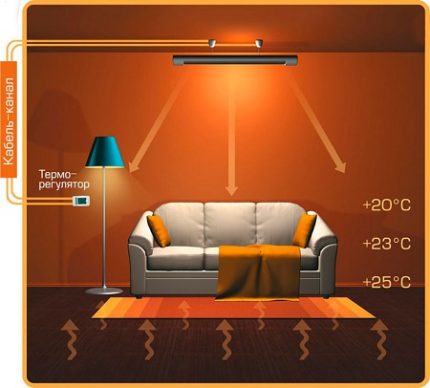
Unlike convection heating, infrared waves do not heat the air around the device, but the surface of the objects they are directed at. The air is already warming from these objects. Understanding this principle will help to use it correctly. infrared heaters.
IR lamp device
An infrared lamp is intended not so much for lighting as for heating. To provide heat to the whole room or even the house, special heaters of various types and sizes have been created. IR lamps are more suitable for thermal exposure to individual areas of the room.
The most common models of such devices are a glass flask, inside of which there is a tungsten filament.
Mirror coating directs the flow of infrared radiation in the right direction and increases the efficiency of thermal effects. Most often, such a light bulb can be screwed into a standard E27 cartridge and powered from a regular 220 V network.
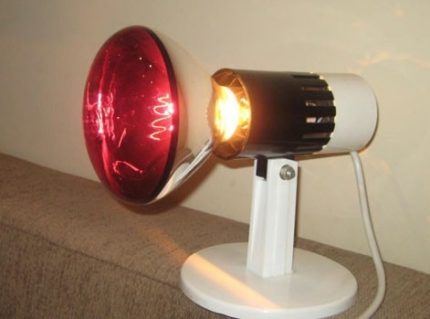
Lamp power can vary between 50-500 watts. It is not recommended to use a plastic cartridge with such devices, it is better to take ceramics. The cartridge and lampshade for the IR lamp must withstand heat up to 80 degrees, not every plastic is capable of this.
For the same reason, it is not recommended to touch the infrared lamp on; a serious burn can be obtained. To protect against accidental contact, use a grill.
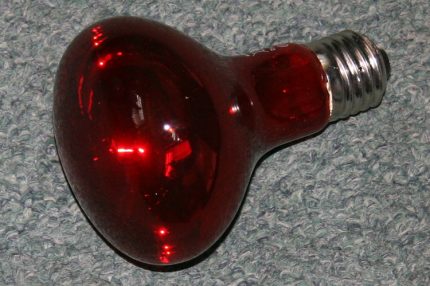
The glass of which such a lamp is made can be standard, tempered or pressed. The flask is left transparent, but is often colored red or blue.
Contrary to popular belief, blue staining is not an exceptional sign. ultraviolet devices. The filament in infrared lamps can be not only made of tungsten, some manufacturers use carbon for these purposes.
The reflector is marked as IKZK, IKZS and IKZ, which indicates red, blue or lack of staining. Separately, it is worth mentioning IR lamps, made not as a traditional bulb, but as a narrow tube.
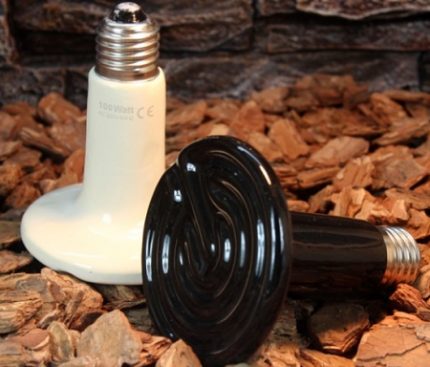
Finally, there is a very special kind of lamps of this type, they are equipped with a ceramic body and are intended only for heating where lighting is not needed.
As a heating element in such devices, a nichrome or fechral filament is used. These are very strong and durable devices; they are not afraid of contact with water splashes. Such devices are widely used for night heating of young animals, as well as for the home keeping of exotic animals: reptiles, snakes, etc.
Features of choosing a suitable option
Most often, the IR lamp is designed for a standard E-27 cartridge, but there are other options, this point should be considered before buying.
In addition to the type of cap, when choosing an infrared lamp, you should take into account such indicators as:
- wavelength IR radiation
- power heating device;
- voltage nutrition.
Long, medium and short wave infrared radiation vary in the amount of heat and light. The brighter the infrared lamp shines, the shorter the radiation wave, and the farther the area of its penetration.
The heat of devices emitting long waves is considered to be milder in effect.With voltage problems usually do not arise, since household appliances of this type are traditionally rated for 220 W in a conventional network.
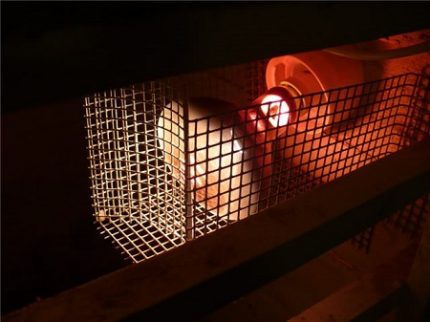
As for power, it is chosen depending on the size of the area that needs to be heated. For 10 square meters, it is recommended to take 1 kW of power. You can slightly increase the resulting figure, depending on the heat loss.
This is true for poorly insulated rooms, objects located on a cold floor, if the room has old windows with cracks in dry frames, etc.
IR lamps vary in shape and diameter, they are marked in accordance with these signs. To understand the dimensions of the product by code, you will have to do some small calculations. The digital numbers that are indicated next to the letter code must be divided by 4 to get the diameter in inches.
The result can be easily converted to centimeters. For example, for a PAR38 lamp, the calculations would look like this: 38: 4 = 4.75 inches; 4.75 * 2.54 = 12.07 cm. The letters indicate the shape of the bulb, the meaning of the code is presented in the table:
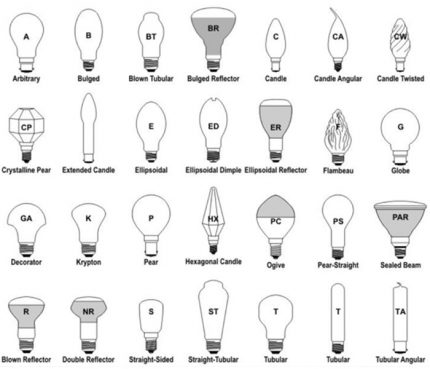
The number R indicates the presence of a reflector. Such models usually have a very simple design. The glass part of the bulb through which the radiation passes is seamlessly connected to the reflector, inside there is a layer of reflective paint. The angle of illumination is more than 45 degrees.
Models marked BR are bulbs with a convex reflector coated with paint or other reflective material.
The transparent flask combined with it can be glossy or matte, sometimes there is a variant with cells that reduce the level of radiation scattering. Such models also usually have an angle of illumination over 45 degrees.
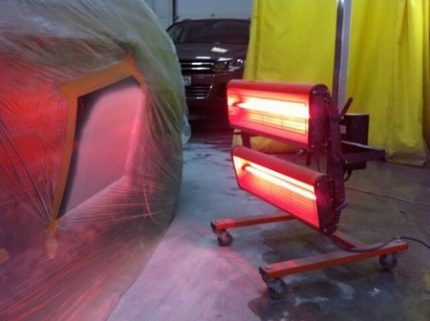
Models type PAR are equipped with a parabolic reflector with an aluminum coating. A tempered glass bulb with a cellular structure is attached to it. The precisely calculated shape of both elements ensures complete tightness of the device.
Typically, such models are slightly shorter than the analogues described above, they are considered more reliable and are suitable for operation in difficult conditions.
The advantages of infrared heating
As already mentioned, IR lamps are used for spot heating of individual zones. Although in crop production or animal husbandry several lamps can fully satisfy the heat demand of a greenhouse, chicken coop, etc. Winter garden, balcony, freestanding kiosk, and other similar objects are advantageously heated with infrared lamps.
Here are the most basic advantages of devices of this type:
- compact sizes;
- simple installation;
- high efficiency;
- heat distribution without fans, etc.
Air practically does not absorb infrared waves, which deliver heat directly to the heating object. As a result, it is not necessary to direct heated air currents so that they spread throughout the room, as is done with convection methods. Even if the lamp is located under the very ceiling, the heat will reach the goal.
For the operation of such a heater, oxygen is not needed, therefore its presence favorably affects the atmosphere in the room.
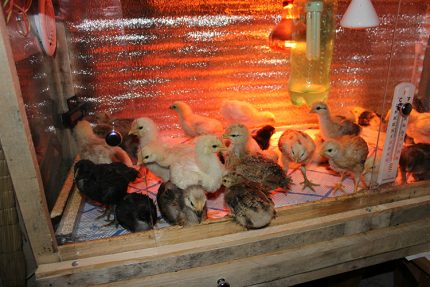
Due to the lack of convection, dust also does not move around the house. IR lamps are not difficult to store if they are used only seasonally.To install or remove the device, you just need to screw it into the cartridge or unscrew from it.
The device does not require special storage conditions, with careful handling, it more than fulfills the resource laid down by the manufacturer.
Such lamps are convenient to use if you need to heat a particular place. For example, if the balcony turned out to be too cold in the winter, a pair of small lamps will help to quickly solve the problem, and in the summer they can simply be removed and hidden. It is also worth recalling the beneficial effects of infrared radiation on human health.
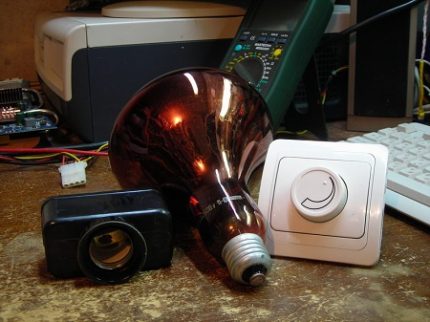
They are used for medical purposes in medical institutions, but even at home the healing effect does not disappear. Although there are medical devices for treatment, household lamps are not suitable for this.
Another advantage of infrared lamps is the ability to easily change the height of the lamp above the floor. This point is especially relevant when growing plants and young animals.
The relevance of lamp heating
Such lamps are widely used in animal husbandry, both in the industrial sphere and in small households. Infrared lighting is almost indispensable when growing newborn offspring. It creates a suitable temperature, carefully dries bedding materials, produces a disinfecting effect.
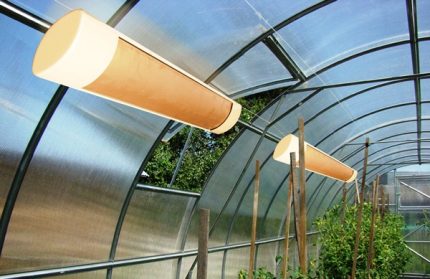
For piglets of the first week of life, it is recommended to use a lamp of the type IKZK-250, the height of suspension from the floor is 50 cm. In the next two weeks, the lamps are raised another 25 cm, then this distance is adjusted to one meter. At this height, this model allows you to heat about one square meter of area.
To grow chickens, you should use an infrared light bulb that can warm the cage to 23-32 degrees. During the day, the temperature should change, so you need to install a thermometer in the cage, and outside - a thermostat, which will change the intensity of heating.

Some are sure that in the first 20 days of life of chickens, red bulb lamps should be used to reduce stress factors for young animals. Wiring must be laid on the outside of the cage. It is recommended to use lamps with a protective grill to protect chickens from burns and glass from damage.
Periodically, after cooling, it is necessary to clean the surface of the device with a damp rag from dirt, otherwise it will work with increased load and may burn out too quickly. For chickens, you should not take cheap lamps with thin flasks that burst when accidentally in contact with water drops.

In small home greenhouses, the level of warming depends on the needs of the crops that are grown there. It will take several lamps, usually the distance between them is about a meter and a half. The lamps are suspended so that the height can be changed: they are raised up as the plants grow in order to avoid overheating.
In addition to these areas, infrared radiation is also successfully used in the construction and automotive industries to dry various surfaces. IR light is also suitable for drying herbs, spices, food products, etc. Another option is to heat up the plastic for molding.
Presentation of popular manufacturers
The market for IR lamps is quite wide and diverse.According to consumer reviews, products from such well-known manufacturers as Philips, InterHeat and Osram are very popular.
Not the lowest price for IR lamps is fully offset by increased reliability, modern design and long life.
Manufacturer # 1 - Philips
These are the characteristics that Philips models make. They can be safely used where there is a danger of exposure to water splashes: in bathrooms, in kitchens, in livestock buildings.
Philips PAR lamps can reduce heat consumption by up to 30% compared to peers with an improved reflector. About 90% of the electricity is converted to infrared radiation. These products are highly durable.
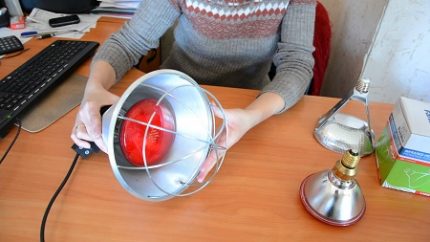
Manufacturer # 2 - Osram
Osram SICCATHERM products are highly efficient. The lamp power varies from 150 to 375 watts. They are designed for use with the standard E27 base, the angle of illumination is 30 degrees.
Red bulbs in this line are labeled RED, matte bulbs are marked with the letters FR, and transparent bulbs are marked with CL.
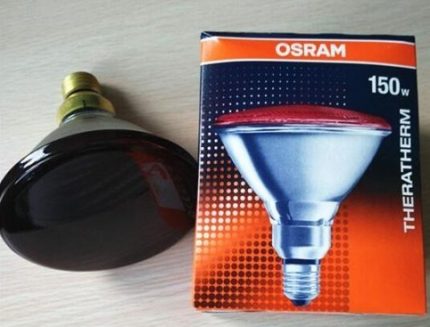
Most often, such lamps are used in animal husbandry, as well as for drying painted and varnished surfaces.
Manufacturer # 3 - InterHeat
InterHeat IR lamps are universal; almost all of them are suitable for a standard base. Their distinctive feature is the increased resistance of the glass bulb to the effects of splashes and accidental impacts.
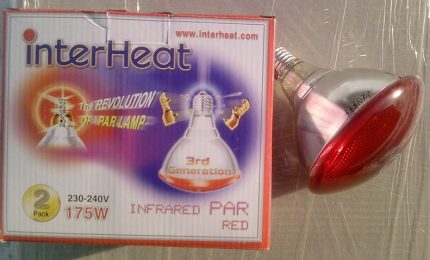
These lamps are widely used in the rearing of young animals and birds. The bulb can be transparent or red, the power of the heaters varies over a wide range and can range from 100 to 375 watts.
Conclusions and useful video on the topic
An overview of the IR lamp IR150RH E27 from PHILIPS can be seen in the following video:
This video contains useful information on choosing an IR lamp for heating animals:
An interesting comparison of the characteristics of a mirror and ceramic IR lamp:
Of course, such devices cannot fully provide heat to a house or a large room. But there are situations when the IR lamp is simply irreplaceable. If the device is selected correctly, it will provide uniform and relatively inexpensive heating exactly where it is needed.
And how did you pick up an infrared bulb for installation in a house / apartment? Tell us about what has become the decisive argument for you in favor of this or that decision. Please write comments in the block below, ask questions, post photos on the topic of the article.

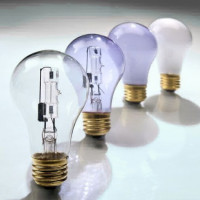 Halogen lamps: device, varieties, nuances of choice + review of the best manufacturers
Halogen lamps: device, varieties, nuances of choice + review of the best manufacturers 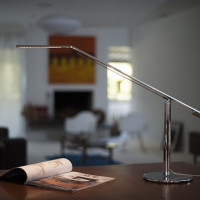 LED table lamps: types, selection rules + review of the best manufacturers
LED table lamps: types, selection rules + review of the best manufacturers  Compact fluorescent lamps: varieties + an overview of the best manufacturers
Compact fluorescent lamps: varieties + an overview of the best manufacturers 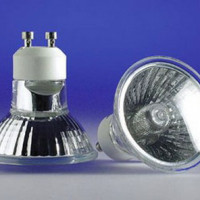 12 Volt Halogen Lamps: Overview, Features + Overview of Leading Manufacturers
12 Volt Halogen Lamps: Overview, Features + Overview of Leading Manufacturers 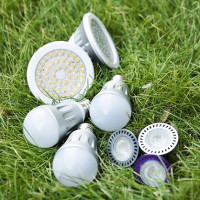 LED lamps for the home: which diode bulbs are better, LED lamp manufacturers overview
LED lamps for the home: which diode bulbs are better, LED lamp manufacturers overview 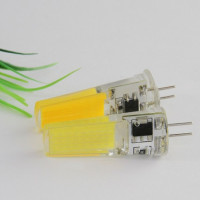 LED bulbs g4 to 12v: features, rules of choice + review of the best manufacturers
LED bulbs g4 to 12v: features, rules of choice + review of the best manufacturers 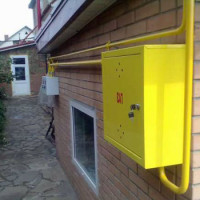 How much does it cost to connect gas to a private house: the price of organizing gas supply
How much does it cost to connect gas to a private house: the price of organizing gas supply  The best washing machines with dryer: model rating and customer tips
The best washing machines with dryer: model rating and customer tips 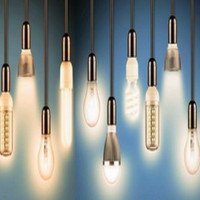 What is the color temperature of light and the nuances of choosing the temperature of the lamps to suit your needs
What is the color temperature of light and the nuances of choosing the temperature of the lamps to suit your needs 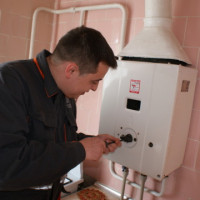 Replacement of a geyser in an apartment: replacement paperwork + basic norms and requirements
Replacement of a geyser in an apartment: replacement paperwork + basic norms and requirements
Not so long ago I thought about buying an infrared lamp. I began to search on the Internet which model is better to take. After all, the market for such lamas is wide and diverse. It should be noted that infrared lamps are not cheap, but it is offset by high quality and long life.On your site I read information about what type and size I should take a lamp.
I want to use infrared lamps to heat a 4x5 m log cabin, ceiling height 2.2 m. How safe are they for this purpose?
100% safe.
Hello. IR lamps do not provide any other radiation than thermal. The main thing is to choose the right lamp so that the chickens feel comfortable. According to your question, it is suitable if it is possible to equip it at a height of 0.5-1 m from perches. But you should avoid getting moisture on the lamp and not let the chickens peck it by wrapping the flask in a protective mesh casing. Avoid overheating, the normal temperature for chickens is 12-18 degrees.
At what height do I hang the lamp in the chicken coop so that it warms?
Hello. The optimal installation of an infrared lamp in a chicken coop is from 0.5 to 1 meter from chickens. However, this height is not enough to protect the device, large birds can damage the light bulb or get burned, so a protective cover should be provided. Many use a fishing cage for this purpose. The optimum temperature in the place of accumulation of hens is 12-18 degrees, humidity 70%.
Is it dangerous for a person to be under such a lamp?
I have the same question))). Strange, no one answers.